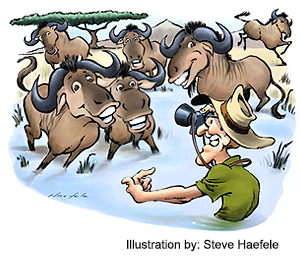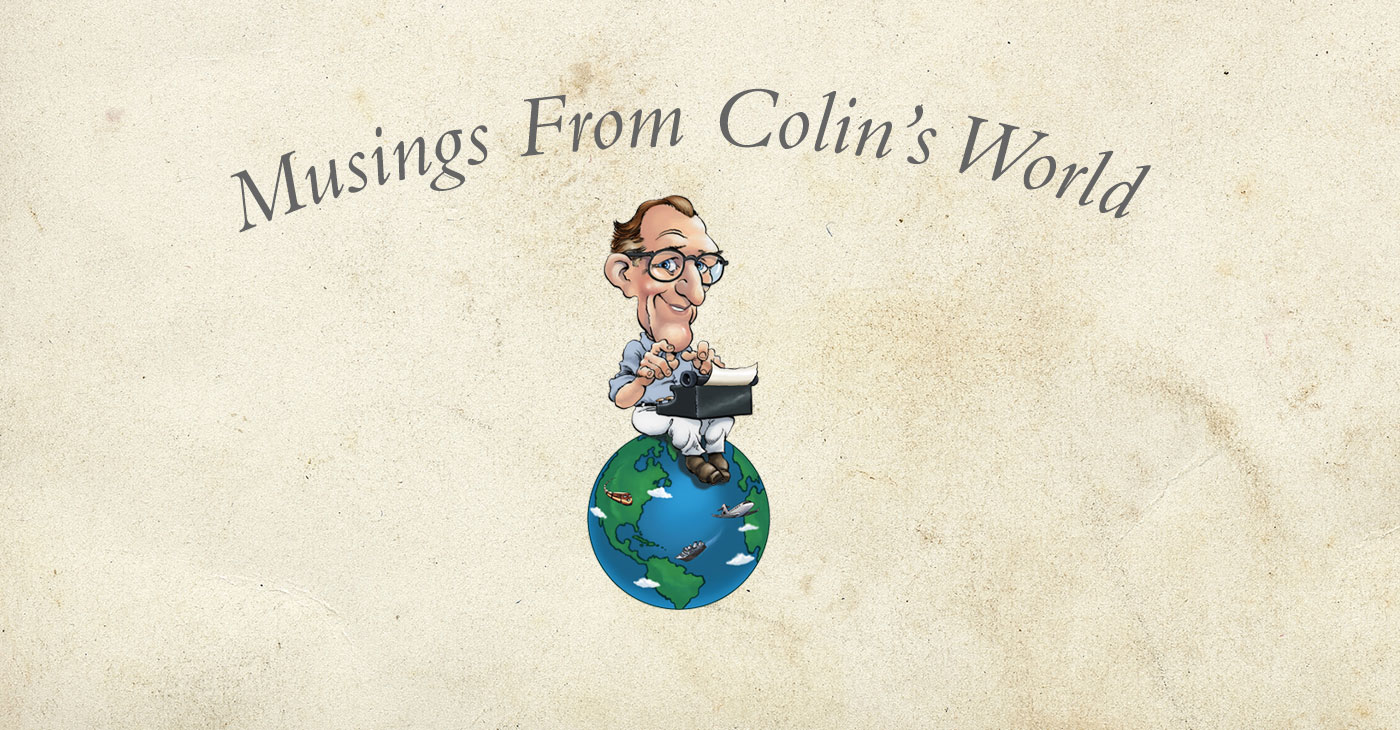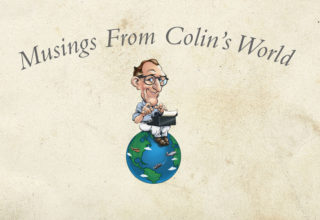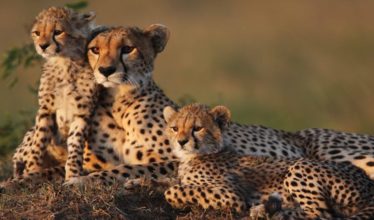When we pulled up to the safari lodge and got out of the car, I found myself enveloped in a rich, fresh atmosphere, surrounded by green plants and trees, and a sense of calm and well being descended upon me. We followed a wooden plank walkway over a tiny pond to the registration desk at the main lodge. There was an instant change in my mood just being there in the calm, pastoral environment.
I was assigned my own little cabin with a wooden porch with lounge chairs and a small table separated by a sliding glass door from a tall bed covered with an assortment of pillows and surrounded by a frame draped artistically with white mosquito netting.
At 7 p.m. we met at the main lodge for a hearty meal before turning in for an early night in preparation for a 5 a.m. wake up call for the morning game drive. Just before dawn we planned to head out into the wilderness in a jeep-like safari vehicle to try to catch sight of some of the nocturnal animals before they disappeared for the day.
We met in the main lodge for coffee or tea and biscuits before climbing into a Range Rover with our ranger guide, a man with the knowledge and experience to read signs in the environment that would have been invisible to the untrained eye. He saw evidence in tracks, dung and broken branches that would lead us to the animals we wanted to see. The rangers cooperate with each other by exchanging information about where the wildlife are on a particular day.
Driving across the plains in an open vehicle at dawn the air was cold and I was glad to have a warm down jacket, a scarf and a stocking cap to keep me warm. Being cold is not something I expected when heading out on an African safari. But be forewarned, it gets very cold with the wind blowing over you in the open vehicle. Fortunately, there were also blankets in the vehicle to keep warm until the sun came up and warmed the land.
The word was out among the rangers that some lions had taken down a buffalo. Our ranger, Alan, urged us to get going quickly so we could catch them in action. We drove to where two lionesses were feasting voraciously on what had been a living animal only hours before.
I wasn’t really sure what I was feeling, but I was fascinated. I knew I was observing nature in the raw. This was not a TV documentary in which some announcer was going to start describing what was happening in terms of scientific theory. There was no filter. It was not a zoo. There was no human intervention. I had the feeling I was seeing the laws of nature operating more clearly than I had ever seen them before. It was as if a cloudy window glass was removed from my sight and I was suddenly seeing nature, the struggle for survival, in its pure form for the first time.
Intellectually I was well aware that predators like lions take down other animals to eat. But knowing about it intellectually did not prepare me for what I was seeing. Suddenly I was standing closer to the root of my own existence. This was an experience I would never forget. My perspective on life was altered, and my world view would never again shrink back to what it had been before, when all I knew of wild animals came from zoos and movies, books and magazines.
We were lucky that day, we saw four of the Big Five: the lion, the buffalo, the rhino and the elephant, all of them but the elusive leopard. And in addition we saw a great deal more, including the fantastically gargantuan and yet graceful giraffes and the zebras with the wild eye-crossing patterns of their coats and their elegant, spirited galloping.
Our guides were full to overflowing with knowledge about the animals and plants we were seeing, and they kept up a running narrative full of fascinating insight into the nature that was surrounding us.
Besides the overall spiritual shift I experienced by being so close to nature on such a grand scale, there was also one particularly odd experience that was just my own. I fell in love with the wildebeest. It was one of those surprises that always happen when you travel, something I never would have even remotely imagined.
I knew next to nothing about the wildebeest, and had little interest in learning more. They looked like ugly, scraggly animals to me, with oversized bison-like heads, dingy stripes on their sides like zebras and hairy tails like horses. They seemed like mismatched concoctions of traits that looked better on other animals. I thought of them as dumb herd animals that the lions could easily pick off for a meal.
But when I saw them in person they began to grow on me. They were not the hulky, lumbering things I had imagined. They are antelopes. When I saw them in motion I began to appreciate their gracefulness. They ran with a beautiful rhythmic gait, and they seemed to express joy in their motion. They seemed to love to run and prance and dance just for the pleasure of it. They were much more endearing in real life than they had ever appeared in documentary films.
Then there was one scene that really closed the deal with me and made me a wildebeest fan forever. We were watching a lion walking up a broad incline just as the sun was coming up, a big male with a thick mane. Out of the corner of my eye I detected something else moving and when I turned to look I saw that it was a wildebeest. It was walking down the incline toward the lion. Toward the lion. I couldn’t process this. The wildebeest was walking toward the lion.
I thought, Is he crazy? If I had been that lone wildebeest, I would have been high-tailing it in the other direction, as far as possible from that lion.
But no, the wildebeest was walking toward the lion and looking right at it. It was a definite interaction. When the wildebeest reached about 10 yards from the lion it turned its body sideways and danced around in front of the lion as if taunting it. I couldn’t believe it. And yet I saw it. What spirit it had! It really was taunting that lion. There was no mistake about it. It reminded me of Muhammad Ali in the ring, taunting his opponent, “float like a butterfly, sting like a bee.” There was some great spirit of defiance in the wildebeest’s actions. And I fell in love.
I suppose the lion had already eaten its fill and was looking for a place to sleep. And perhaps the wildebeest sensed that and knew it was not encountering the threat of a hungry lion. Maybe it was decoying the lion to lure it away from its young, hidden somewhere unseen.
Who knows? In any case it was a bold move.
As I got to know the wildebeests in that brief time, I came to see them as not only graceful runners and dancers who prance around with apparent joy, they are also playful, and bold. They exhibited many of the best characteristics of my heroes in the human world.
From that moment I loved the wildebeest and felt a cross-species affection that I will never lose.
I did not go to Africa because I was a big wildlife enthusiast. I probably appreciated animals as much as the average city dwelling person. They were not a big part of my conscious focus on a day-to-day basis. But what I experienced affected me deeply. It was not just the animals, it was the whole spectacle of nature, and most importantly perhaps, the feeling of my place as a human within that natural realm.
But what drew me to Africa was the human side of it, the history, culture, art, music and all of those human things. But even when you go out in the bush you are experiencing nature through a human community that includes the rangers, the people who run the lodge, the housekeepers, food service people and chefs.
When you experience it, it is through a network of specialists who live and breathe the wilderness, who take dominion and stewardship of a plot of nature and cultivate a system by which they can present the experience to you.
Africa is full of all those other human elements that are part of virtually any travel destination. It has its cities, with many hybrid cultures from its complex history of colonization from European countries, which carved African territory up and left their own cultural imprint on each part. So when you are in a former English colony, you drive on the left. When you are in one of the former French colonies, the native people speak French. Each place also has its native culture, music, art and cuisine, which were spread through the colonial powers back into Europe and into the Americas. You can trace back those influences to their origins.
To me Africa is essential. I feel like everyone should experience it. It is unlike any other place in many ways. It is full of wonder.
Your Humble Reporter,
A. Colin Treadwell


